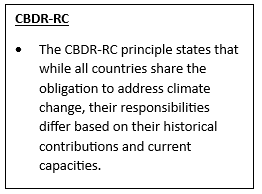Context: Recently, the G20 Climate and Environmental Sustainability Working Group Ministerial Meeting held in Cape Town, South Africa.
India’s Stance on Key Thematic Priorities

- Equity in Environmental Governance: India called for the reaffirmation of the principle of Common but Differentiated Responsibilities and Respective Capabilities (CBDR-RC).
- Biodiversity Conservation: India promotes ecosystem-based, participatory, and landscape-level conservation models. It adopts a nuanced and ethical approach to biodiversity management, ensuring sustainability over commodification.
- Land Degradation Neutrality: India recognizes land restoration as both an economic and ecological opportunity.
• Chemicals and Waste Management:
- India advances circular economy principles and showcases its Extended Producer Responsibility (EPR) frameworks as scalable global models.
- Climate Change and Just Transitions: India urged the group of big and emerging economies to “act as a bridge” between ambition and implementation, ensuring that every nation’s contribution is respected and every nation’s capacity is enhanced to meet the environmental challenges and climate action goals.
- Air Quality: India promotes cooperative capacity-building initiatives tailored to diverse national contexts, ensuring effective and inclusive air quality management.
- Oceans and Coasts: India advances Marine Spatial Planning for sustainable ocean use and biodiversity protection. It supports voluntary measures to manage abandoned fishing gear, safeguard small fishers’ livelihoods, and decarbonize marine transport through equitable and just transitions.
- Climate Finance: Monetary assistance to developing countries to meet the vital environmental challenges needs to be honoured as an onerous duty rather than a mere promise.

